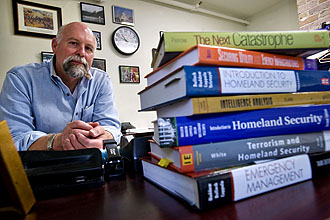A Clear and Present Safety
With a newly added master's degree program and an enrollment of more than 200 students, Tulane University's four-year-old homeland security program continues to thrive.

An "all hazards" approach, training leaders to respond to a variety of threats, is one key to the success of the Tulane Homeland Security Program, says its director, Keith Amacker. (Photo by Paula Burch-Celentano)
Its director Keith Amacker credits the program's growing popularity to quality faculty, rigorous coursework and an "all hazards" approach that trains leaders capable of responding to the threat of natural disasters, terrorism or human error.
"A lot of homeland security programs want to concentrate just on anti-terrorism and that's a bunch of malarkey," says Amacker, a retired Navy captain who, before coming to Tulane, worked as a consultant in the effort to reform the Afghan army and police.
Amacker says that while "tempting targets" for terrorists exist everywhere, a constant threat also lurks in the vagaries of Mother Nature and the folly of humans, a point made all too clear to Gulf Coast residents in August of 2005.
Hence, in addition to core courses in math and the humanities, the homeland security program offers classes that range from emergency management, to intelligence analysis, to cyber warfare, to infrastructure protection, depending on each student's career goals.
A lot of those students come from military or law enforcement backgrounds and are first responders looking to move into leadership roles. Others are business leaders wanting to learn how to reduce the high cost of disaster-related business interruption. Many are traditional Tulane students wanting to enter a new, challenging and growing field.
In addition to attracting more students, the homeland security program also has created a stir internationally, according to Rick Marksbury, dean of the School of Continuing Studies, which coordinates the program.
"Representatives from the Naval War College and the U.S. Army Command and Staff College recently contacted us about what we are teaching and the materials we are using," Marksbury says. "People from Sweden and Italy have met with our director to get more information."
